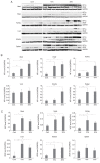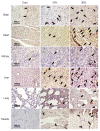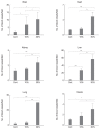Induction of Angiogenesis by Malarial Infection through Hypoxia Dependent Manner
- PMID: 31104403
- PMCID: PMC6526210
- DOI: 10.3347/kjp.2019.57.2.117
Induction of Angiogenesis by Malarial Infection through Hypoxia Dependent Manner
Abstract
Malarial infection induces tissue hypoxia in the host through destruction of red blood cells. Tissue hypoxia in malarial infection may increase the activity of HIF1α through an intracellular oxygen-sensing pathway. Activation of HIF1α may also induce vascular endothelial growth factor (VEGF) to trigger angiogenesis. To investigate whether malarial infection actually generates hypoxia-induced angiogenesis, we analyzed severity of hypoxia, the expression of hypoxia-related angiogenic factors, and numbers of blood vessels in various tissues infected with Plasmodium berghei. Infection in mice was performed by intraperitoneal injection of 2×106 parasitized red blood cells. After infection, we studied parasitemia and survival. We analyzed hypoxia, numbers of blood vessels, and expression of hypoxia-related angiogenic factors including VEGF and HIF1α. We used Western blot, immunofluorescence, and immunohistochemistry to analyze various tissues from Plasmodium berghei-infected mice. In malaria-infected mice, parasitemia was increased over the duration of infection and directly associated with mortality rate. Expression of VEGF and HIF1α increased with the parasitemia in various tissues. Additionally, numbers of blood vessels significantly increased in each tissue type of the malaria-infected group compared to the uninfected control group. These results suggest that malarial infection in mice activates hypoxia-induced angiogenesis by stimulation of HIF1α and VEGF in various tissues.
Keywords: HIF1α; Plasmodium berghei; VEGF; angiogenesis; hypoxia; malaria.
Conflict of interest statement
The authors declare no conflict of interest related to this study.
Figures






References
-
- Engwerda CR, Beattie L, Amante FH. The importance of the spleen in malaria. Trends Parasitol. 2005;21:75–80. - PubMed
-
- Deininger MH, Winkler S, Kremsner PG, Meyermann R, Schluesener HJ. Angiogenic proteins in brains of patients who died with cerebral malaria. J Neuroimmunol. 2003;142:101–111. - PubMed
MeSH terms
Substances
LinkOut - more resources
Full Text Sources
Medical

